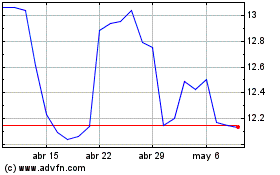By Mike Colias and Ben Foldy
The United Auto Workers and Detroit car companies reached
agreements on coronavirus-mitigation efforts that for now will
avoid a two-week shutdown of U.S. factories.
The UAW had been pressing General Motors Co., Ford Motor Co. and
Fiat Chrysler Automobiles NV to idle their plants to protect
workers from the virus. The union said late Tuesday that company
executives had agreed to partial shutdowns of plants to allow for
cleaning between shifts and longer periods for shift changeovers,
along with other measures to minimize worker contact.
A GM spokesman declined to comment on the new measures and said
the company has been working on mitigation efforts for weeks. A
Fiat Chrysler spokesman confirmed the company agreed to additional
safety precautions. Ford didn't immediately reply to requests for
comment.
Meanwhile, Ford confirmed Tuesday evening it temporarily closed
the company's Chicago assembly plant because of a parts shortage. A
nearby Lear Corp. plant that supplies parts to the Ford factory is
closing temporarily after two employees tested positive for
Covid-19, people familiar with the matter said. The plant was
closed for disinfection after one worker tested positive and
another is likely to have contracted the disease, a Lear spokesman
said.
The Ford factory, which makes the Ford Explorer and Lincoln
Aviator sport-utility vehicles, is expected to be down for at least
Tuesday night's eight-hour shift and for part of Wednesday, the
people said.
Shutting off production across U.S. factories would deal another
financial blow to the Detroit auto makers, which have been
grappling with virus-related disruption globally. The outbreak in
China has decimated vehicle sales there and caused ripple effects
through the global automotive supply chain.
Ford is considering cutting shifts at some of its U.S. factories
to limit the risk to employees, although no final decision has been
made, people familiar with the matter say. If the cuts are enacted,
it would mark the first time an auto maker in the U.S. has
significantly curtailed production because of the outbreak.
Eliminating a shift at a factory that works round the clock on
three shifts would allow more time for disinfecting the facility, a
person with knowledge of the company's deliberations said. It also
would reduce the mingling that occurs between workers on shift
change, the person said.
In Europe, Ford and other major car companies have temporarily
closed their factories as the outbreak has spread there.
On Tuesday, local authorities told Tesla Inc. that it must stop
production at its Fremont, Calif., factory as part of an order by
Alameda County to have people shelter at their homes to prevent the
spread of coronavirus.
Shutting down plants results in an immediate hit to the bottom
line for car companies, which book revenue as soon as they ship
vehicles from the factory to dealerships. A 40-day strike at GM's
U.S. plants last fall drained $3.6 billion from GM's bottom
line.
Some factory workers have complained on social media that they
feel unsafe showing up for work, particularly as many of the
companies' white-collar employees were told to work from home.
"There is serious concern from our employees and rightfully so,"
said Todd Dunn, president of the union's chapter representing
Ford's Louisville, Ky., plants. "If I could send them home and give
them money, I would."
Global auto makers have been relying on the health of the U.S.
market this year, as China and more recently Europe have seen car
sales and production collapse as a result of the pandemic.
So far, car companies have fended off parts shortages to keep
plants running in the U.S., which accounts for the lion's share of
profits at GM, Ford and Fiat Chrysler. The prospect of auto makers
cutting U.S. production has Wall Street analysts scrutinizing their
balance sheets to gauge how well they could weather a prolonged
shutdown.
The Detroit companies are in a much stronger cash position than
they were heading into the financial crisis a decade ago, which
ultimately forced GM and Chrysler into bankruptcy.
At the end of last year, GM and Ford each had at least $35
billion of cash and liquidity, while Fiat Chrysler had about EUR15
billion ($16.5 billion), according to securities filings.
In an investor note Tuesday, Morgan Stanley analyst Adam Jonas
said the companies "are categorically in a strong position to
absorb several months of a near shut-down."
Matthew Schulte, who works in the body shop at a Ford truck
plant in the company's hometown of Dearborn, Mich., said many of
his co-workers were anxious about exposure to the virus at
work.
"If the schools and restaurants and everyone else is hunkering
down, and we're still making trucks for people who likely aren't
buying them, it doesn't quite add up," said Mr. Schulte, 47 years
old.
He added, though, that many workers are also worried about
losing their paychecks without any clarity over when the factories
might come back online.
Ian Lovett contributed to this article.
Write to Mike Colias at Mike.Colias@wsj.com and Ben Foldy at
Ben.Foldy@wsj.com
(END) Dow Jones Newswires
March 17, 2020 23:52 ET (03:52 GMT)
Copyright (c) 2020 Dow Jones & Company, Inc.
Ford Motor (NYSE:F)
Gráfica de Acción Histórica
De Mar 2024 a Abr 2024

Ford Motor (NYSE:F)
Gráfica de Acción Histórica
De Abr 2023 a Abr 2024
